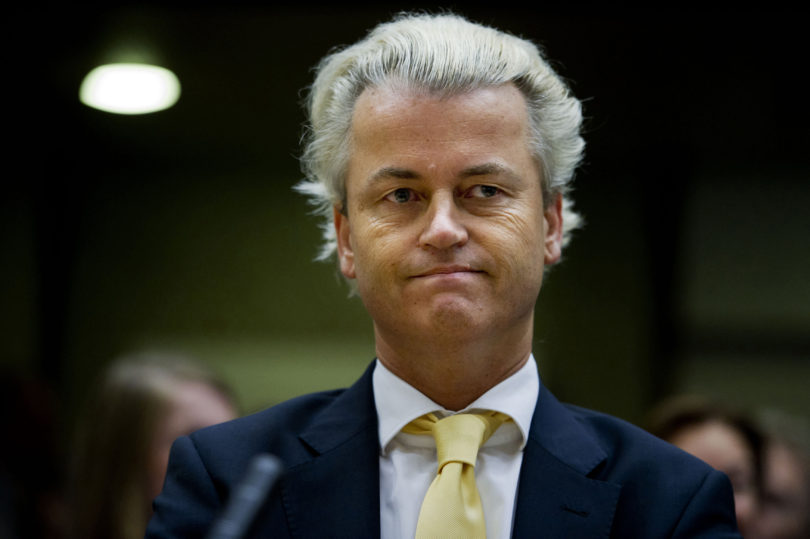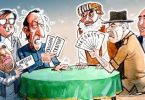By Lal Khan
In Wednesday’s Dutch elections pollsters were proved wrong yet again after Brexit and Donald Trump’s flabbergasting triumph. However this time around they faltered by overestimating Wilder’s grandiloquence. His PVV was a far second with 13.1 percent of the vote. Although the ‘scare’ of alleged neo-fascist threat has for the time being averted but a third term continuance of Rutte’s government will impose even harsher austerity against the workers and ordinary Dutch. Euroskepticism and Xenophobia are far from gone. Rutte has used Wilder’s rhetoric, only more calculatedly when he warned the immigrants, saying, “If you don’t like it here, you can leave.”
The vote of main right-wing parties of Rutte’s VVD and the Christian Democrats (CDA) collapsed as their parliamentary seats plunged from 79 to 42. At least 76 members are needed to form a majority in the 150-seat parliament. But the biggest loser was the Dutch Labour Party (PvdA). It faced the wrath of the workers due to the complicity in the painful austerity measures and massive attacks on social welfare during its rule in the previous coalition government. Its vote dropped from 25 percent to less than 6 percent. Now with only nine seats, it is smaller than the Greens and the ex-Maoist Socialist Party. The Socialist Party’s capitulation on immigration etc. decreased its vote slightly from 9.6 to 9.1 percent.
In contrast, the Green-Left vote went up from 2.3 to 9 percent. It got more than a third of the vote among voters under 34 and in Amsterdam it was the strongest party. A polarised campaign raised the turnout to 82 percent, the highest in last 31 years. But both, the Greens and D66 in spite of their rhetoric of extreme reluctance are implicitly ready to form a right-wing government with Rutte. These petit bourgeois dominated parties ape those in the United States that while opposing Trump ultimately end up into the abyss of the pro-Wall-Street Democratic Party.
Netherlands could be heading for probably the most complicated coalition government of at least four parties, making the kind of austerity decisions that are necessitated by the crisis of Dutch capitalism. There will be intense horse-trading and backroom deals in its formation. This is a recipe of crisis from the start. With one coalition partner objecting to some decisions and the so-called lefts having their reservations on harsh austerity measures and threatening to abandon coalition in a period of social instability where the pressures on the parties from below will be ferocious. While it is also entirely possible that the Dutch workers and youth could erupt in a movement of revolt against austerity and disparage the parties now celebrating victory. The new government could be in jeopardy sooner than most pundits can imagine.
This election vindicated the fact that with the breakdown of the economic equilibrium in Europe and elsewhere the crisis is tearing apart the incumbent political equilibrium. Both the traditional parties of the workers and the bourgeois are in disarray. The disintegration of the two main parties that have dominated Dutch politics since World War II: The Christian Democrats and the Social Democrats have been marginalised.
The situation in the Netherlands was radically different in the period of the post war boom. Amsterdam was renowned as the ‘heart of Europe’. In the 1970’s the PvdA led governments carried out some of the most radical reforms. Under prime minister Joop Den Uyl the PvdA government introduced radical reforms in health, housing and the education system. Den Uyl rejected secrecy and shunned the practices of airs and graces linked with political power. Den Uyl used to participate in meetings with students, trade unions activists and sometimes took part in protest demonstrations.
These days when the immigrant workers are being made the scapegoats and expelled from the European Union it would be astonishing to some today that the Den Uyl government announced the legalisation of all the illegal workers residing in the Netherlands at the time. Hundreds if not thousands of Pakistani immigrants also benefitted. But even the reforms by the Den Uyl government couldn’t impart real prosperity to society within the confines of even Dutch capitalism. With the collapse of the Keynesian model in the late 1980’s and the introduction of neo-liberal economics the Dutch society has changed for the worse.
The rise of Wilders is a symptom, not the cause, of the right swing of the Dutch politics. It reflects a profound crisis of capitalist society and capitulation of the Dutch left leadership and trade union leaders to this system in decline. This crisis exposes the organic crisis of the system even when the Netherlands is having a relatively stable economy as compared to the South European countries. These election results open up a period of massive political instability and fierce class struggles in the stormy period that impends. Holland is a small country of 17 million inhabitants but is today riven with deep social, economic and cultural contradictions. Being a former colonial power, it inevitably brought in a huge immigrant labour in the period of the expansion of its economic growth during the post-war boom. Now with the economic down swing, the immigrant population is being hit hard by growing social inequality.
Ever since the compromises of Labour and the trade union leaders with bourgeois parties, the coalition regimes have been dismantling the previous socioeconomic conquests of the working class. The Dutch working class has had strong and valiant traditions of the class struggle since the early decades of the last century. The present rightwards shift of politics will be short lived. The pendulum shall swing back to the left sharply throughout the European continent. Europe can only be genuinely united on the basis of a socialist federation of Europe. With the deep integration of the EU countries since 1992, a revolutionary victory of the proletariat in any one of the main countries of Europe shall rapidly expand into an all-European phenomenon. The Dutch youth and workers will play a crucial role in this decisive struggle for a socialist victory to emancipate the ordinary people of Europe and far beyond.






